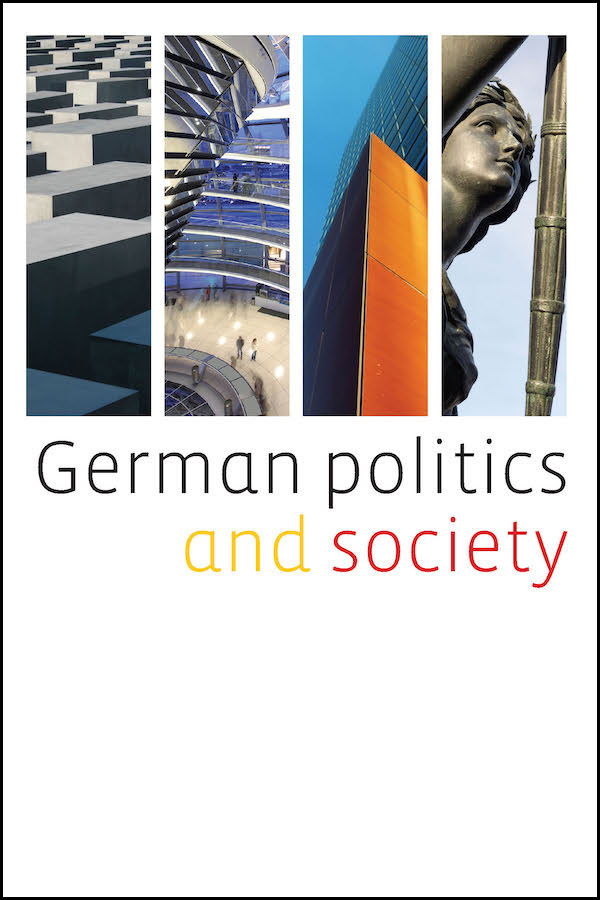
German Politics and Society
ISSN: 1045-0300 (print) • ISSN: 1558-5441 (online) • 4 issues per year
Editor: Jeffrey J. Anderson, Georgetown University
Subjects: German Studies, Politics, Sociology, History, Economics, Cultural Studies
![]() Available on JSTOR
Available on JSTOR
 A joint publication of the BMW Center for German and European Studies (of the Edmund A. Walsh School of Foreign Service, Georgetown University) and the German Academic Exchange Service (DAAD). These centers are represented by their directors on the journal's Editorial Committee.
A joint publication of the BMW Center for German and European Studies (of the Edmund A. Walsh School of Foreign Service, Georgetown University) and the German Academic Exchange Service (DAAD). These centers are represented by their directors on the journal's Editorial Committee.
Latest Issue
Volume 43 Issue 3
Alternative for Germany
Reconfiguring German Democracy
Germany is a liberal democracy that upholds individual rights and the rule of law. Nevertheless, as part of its militant democracy, it has partially legalized and certainly socialized illiberal efforts. The political party Alternative for Germany (AfD) emerged from the schism created by two (il)liberalisms in German democratization. Founded in 2013 on Euroskeptic principles, the AfD has experienced multiple power struggles and has evolved into an anti-Islam, anti-migration party that promotes positive memory politics and German national interests. I consider the AfD as a recent iteration of the ongoing project to redefine German democracy by keeping it aligned with enduring political and ethnocultural legacies. In this article, I discuss two approaches taken to this effect: the logics of “normal” and speech rights.
The Politics of the Zeitenwende in Historical Comparison
This article compares the party-political impacts of the
“Freundship”?
The Deepening of British-German Relations from Pre- to Post-Brexit
This article investigates whether post-Brexit British-German relations can be understood as an “international friendship,” employing a novel framework in international relations theory. It conducts a qualitative-interpretivist case study, analyzing state visits in 2004, 2015, and 2023, with a focus on the discourse of heads of state during these key diplomatic events. The data include speeches, non-discursive practices, and bilateral forums, which are contextualized within the wider literature on international friendship and public diplomacy. These cases illustrate the transformation of the relationship through a time that is commonly considered a deep rupture, most notably through Brexit. The findings indicate that while Brexit indeed posed a challenge, it also led to strengthened British-German relations. Although structural changes are necessary for lasting stability in this bilateral relationship, the two nations have developed a “shared being in time” characterized by reconciled historical memories and a clearer joint vision for the future.
“This Book Says More Than the Entire Exhibition”
An East German Exhibition, Its Guestbook, and the Reception of Historical Memory
This article centers on an exhibition entitled “Berlin in the Twentieth Century” put on by the East Berlin tourist office between late 1961 and early 1963. The exhibition opened just two months after the border's sealing through Berlin and drew over 300,000 visitors. Helping to justify the East German communist dictatorial regime's building of the Berlin Wall, the exhibition argued for separate historical roots of East and West Germany. This article uses a rare source—the exhibition guestbook—to show how visitors reacted to the East German regime's strategy of evoking emotion from the public to create historical memory aiming to serve its larger political objectives. Further, the guestbook functioned as an unusual venue for cross-Iron Curtain interaction and as an example of the regime's fixation with portraying the reception of its building of the Wall as positive. Finally, it reminds us that the Cold War was a mutual East-West co-production.